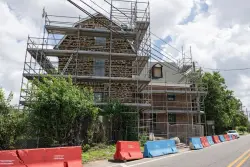ICE Lawyers Are Hiding Their Names in Immigration Court

Inside a federal immigration courtroom in New York City last month, a judge took an exceedingly unusual step: declining to state the name of the Immigration and Customs Enforcement attorney pressing to deport asylum seekers. “We’re not really doing names publicly,” said Judge ShaSha Xu — after stating her own name and those of the immigrants and their lawyers. It was the first of two separate instances The Intercept identified in which judges chose to withhold the identities of the attorneys representing the Trump administration’s deportation regime. As ICE agents across the country wear masks to raid workplaces and detain immigrants, government attorneys need not cover their faces to shield their identities. Legal experts who spoke to The Intercept agreed the practice of concealing the lawyers’ identities was both novel and concerning. “I’ve never heard of someone in open court not being identified,” said Elissa Steglich, a law professor and co-director of the Immigration Clinic at the University of Texas at Austin. “Part of the court’s ethical obligation is transparency, including clear identification of the parties. Not identifying an attorney for the government means if there are unethical or professional concerns regarding [the Department of Homeland Security], the individual cannot be held accountable. And it makes the judge appear partial to the government.” “Part of the court’s ethical obligation is transparency, including clear identification of the parties.” The concealment shocked two lawyers who were representing immigrants in Xu’s courtroom. Attorney Jeffrey Okun, who was representing a client via video call, characterized the move as “bizarre.” Attorney Hugo Gonzalez Venegas called Xu’s behavior “a terrible lack of transparency on the part of officers of the court.” Immigration courts, which are run by the Executive Office for Immigration Review — part of the executive branch, not the judiciary — are far less transparent than most courts. Their prosecutors work for ICE and DHS; they have no obligation to provide defense lawyers; and their judges are appointed — and fired — by the president. Related ICE Agents Deserve No Privacy On a Tuesday morning in late June, Xu was running through several brief, preliminary hearings known as “master calendars.” Nationwide, these proceedings always start out the same way. An immigrant will appear with their attorney — if they have the good fortune to retain one — often on Webex. A judge presides at a big desk in an actual courtroom, in this case in lower Manhattan. An ICE lawyer represents the government in its attempts to deport the immigrant. As each case commences, the judge recites their own name, followed by the immigrant’s name, the name of the immigrant’s attorney (if they have one), and finally, the name of the ICE lawyer. It’s an on-the-record census that enables due process. When Xu omitted the ICE lawyer’s name, Okun asked her to identify who was arguing to deport his client. She refused. Xu attributed the change to “privacy” because “things lately have changed.” Xu told Okun that he could use Webex’s direct messaging function to send the ICE lawyer his email, and the ICE lawyer would probably respond with her own name and address. Okun accepted the arrangement. When the next case commenced minutes later, Xu again refused to state the ICE lawyer’s name, and Gonzalez Venegas, also on Webex, argued that the legal record would be incomplete without it. Xu again said that the two attorneys could message each other confidentially. The government’s mystery attorney, who was prosecuting both Okun’s and Gonzalez-Venegas’s clients, wore glasses and a navy blue suit; her hair was pulled back primly from her face. She spoke quietly, with a tinge of vocal fry. Her name, according to Gonzalez Venegas, was Cosette Shachnow. Shachnow, 33, began working for ICE in 2021, shortly after she graduated from law school, according to public records and her LinkedIn account. The latter lists “Civil Rights and Social Action” among her “favored causes.” Shachnow did not respond to an email from The Intercept seeking comment. Neither did the Executive Office for Immigration Review and the Office of the Principal Legal Advisor, which oversees ICE lawyers. It is unclear how many immigration judges are failing to say ICE lawyers’ names, but The Intercept has witnessed the practice twice. On July 10, Judge James McCarthy in lower Manhattan neglected to identify the government’s attorney in several cases, referring to the lawyer instead as “Department.” “Department, are we done with pleadings?” McCarthy asked. The word stood in for ICE’s parent agency, the Department of Homeland Security. Several immigration defense attorneys were attending the hearings by video. None objected. Judge Shirley Lazare-Raphael, who is also a New York City immigration judge, told The Intercept that the new phenomenon of occluding ICE attorneys’ names has not been formalized via a directive or rule. “It’s up to the judges whether or not they want to do it,” she said. “This is a very new and very disturbing turn of events,” said Daniel Kowalski, a former longtime immigration attorney who now edits the legal journal Bender’s Immigration Bulletin for LexisNexis. “Where does it stop?” asked Kowalski. “Are the immigration judges going to be unnamed? Behind a screen?” Lazare-Raphael said she had heard that some ICE attorneys have said they found it “dangerous to state their names publicly.” That reasoning echoes DHS’s questionable claim that ICE agents need to mask up because of what the department described as an almost 700 percent increase in assaults against agents nationally during the first six months of this year. But as DHS revealed last week, the raw number of assaults this year is 79, compared to 10 in the same period last year. Given that ICE arrests have more than quadrupled since Trump took office — and the agency’s determination of what qualifies as an assault is often dubious — this uptick likely sounds more dramatic than it is. Read Our Complete Coverage The War on Immigrants Veronica Cardenas, who was an ICE prosecutor for six years before quitting in 2023, told The Intercept that she thinks the real threat these lawyers face is shame. She said that her mother came to the United States from Colombia without papers and was arrested at the southern border, and that while she was proud of her daughter when she started working for ICE, Cardenas came to realize the people she was seeking to deport were a lot like her family. Cardenas now works as an immigration defense attorney and counsels other ICE lawyers who want to leave their jobs — many of whom, she said, have backgrounds similar to hers. Adam Boyd, a former ICE attorney who resigned last month, according to a report in The Atlantic, said that many ICE lawyers feel frustrated about having to ask judges to dismiss cases so that ICE enforcement and removal officers can grab immigrants outside courtrooms and swell the Trump administration’s deportation numbers. Boyd said he left after making what he called “a moral decision.” The asylum system has suffered a stunning collapse under President Donald Trump’s second term. In the past six months, judges’ denials of asylum have skyrocketed from rates of 62 to 80 percent — and immigration enforcement statistics expert Austin Kocher predicts that the figure could soon top out at 95 percent. As the Trump administration orders ICE to ramp up its removal operations, hundreds of immigrants to the United States are being arrested and beaten by people with their faces covered and no proof of who they are. Now, they may not know the names of the attorneys making the case to deport them, either. The post ICE Lawyers Are Hiding Their Names in Immigration Court appeared first on The Intercept.

